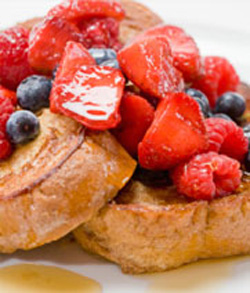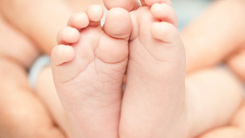Big Breakfast Helps You Lose Weight

by Nicole Gregory
It’s those cravings that do us in — cookies, ice cream, potato chips. The answer, however, is not to banish snacks from your home or to force yourself to resist those cravings through sheer strength of will. The key, according to a surprising new study, is to eat a big breakfast high in complex carbs and protein.
Eating a big breakfast helps us feel full and satisfied for the remainder of the day, cutting down on our urge to overeat. Any diet’s success depends on its ability to reduce the craving for carbohydrates and help a person feel satisfied, notes lead researcher Daniela Jakubowicz, M.D., of the Hospital de ClÌ_åønicas Caracas, in Venezuela. The power of big breakfasts can strip cravings of their strength while still keeping the overall calorie intake low.
The Secret of Big Breakfast
Working with researchers at Virginia Commonwealth University (VCU) in Richmond, Dr. Jakubowicz put 46 obese women on a strict low-carbohydrate diet consisting of 1,085 calories a day. This included 17 grams of carbohydrates, 51 grams of protein and 78 grams of fat. The smallest meal of the day was breakfast at 290 calories. Another group of 48 women was assigned to a 1,240-calorie-a-day diet that included 97 grams of carbohydrates, 93 grams of protein and 46 grams of fat. The kicker: They started their morning with a big, high-carb, high-protein, 610-calorie breakfast.
After four months, the women on the lower-calorie, small-breakfast diet had lost an average of 28 pounds, while the women on the higher-calorie, big-breakfast plan had lost 23 pounds. But when both groups went on the four-month maintenance phase of the diet, the results were amazing: Women in the small-breakfast group regained about 18 pounds, while women following the big-breakfast strategy continued to lose weight, shedding roughly 16 more pounds! Final score: small breakfast 10 pounds, big breakfast 39 pounds!
Why did the big-breakfast group lose more weight in the end? “The women on the big-breakfast diet reported reduced hunger, increased satiety and decreased desire to eat carbohydrates and sweets before lunch and dinner,” says VCU researcher Paulina A. Essah, M.D. In other words, eating a big breakfast helped them feel full and satisfied for the rest of the day.
Make Breakfast Work for You
In case you’re wondering, a breakfast of doughnuts will not provide the same result. “We recommend high-protein foods, like eggs, meat or dairy products; and complex carbohydrates with high fiber, such as whole grains and fresh fruits,” says Dr. Essah.
But here’s the real beauty of the big-breakfast weight-loss strategy: It works whether you want to lose five pounds or 25. “Any[one] can do this anytime to lose weight,” says Christine Gerbstadt, R.D., a spokesperson for the American Dietetic Association. Even better, you don’t have to radically alter your breakfast habits in order to increase carbs and protein. “You could simply put strawberries or bananas on your cereal or sprinkle the cereal with nuts. Try eating two eggs with whole wheat [toast] for breakfast once in a while, or have some yogurt with dried fruit and cinnamon,” she suggests.
To further reduce the power of cravings, eat two to three snacks each day so you don’t get too hungry between meals. This will reduce the likelihood of overeating. And while it’s a good idea to avoid foods that you know will trigger a binge, that doesn’t mean you have to completely deny yourself foods you love. If you have a craving for hot fudge sundaes (and can handle it in moderation), then “have a small portion,” says Gerbstadt, “or pick one day of the week when you’re going to have that sundae.”
Nicole Gregory, contributor to Live Right Live Well, is a Los Angeles-based writer who has written for numerous publications, including Weight Watchers magazine, Vegetarian Times, Viv, Fit Pregnancy and many others.




